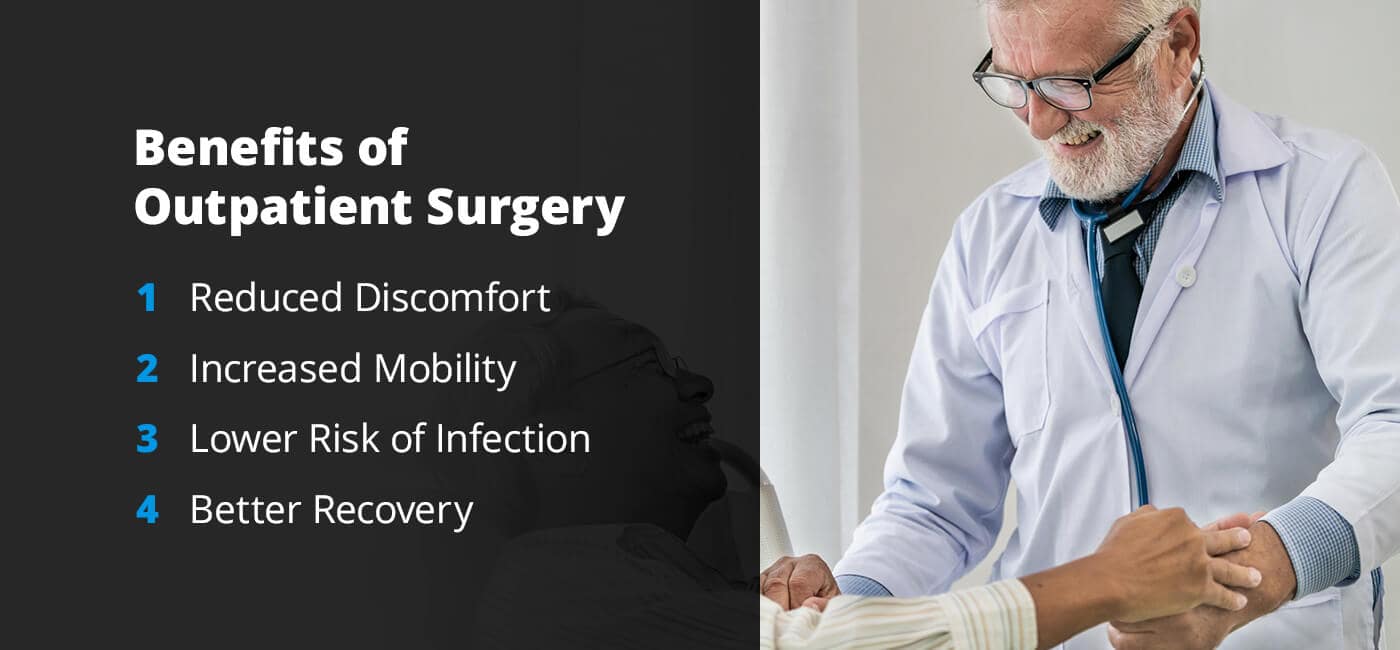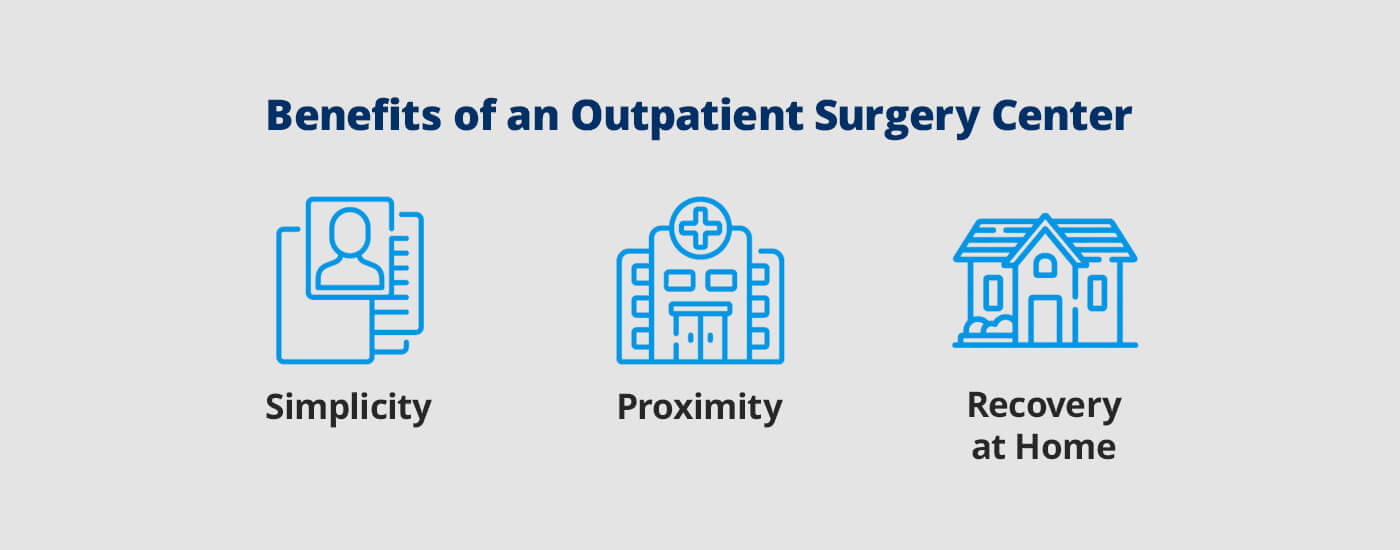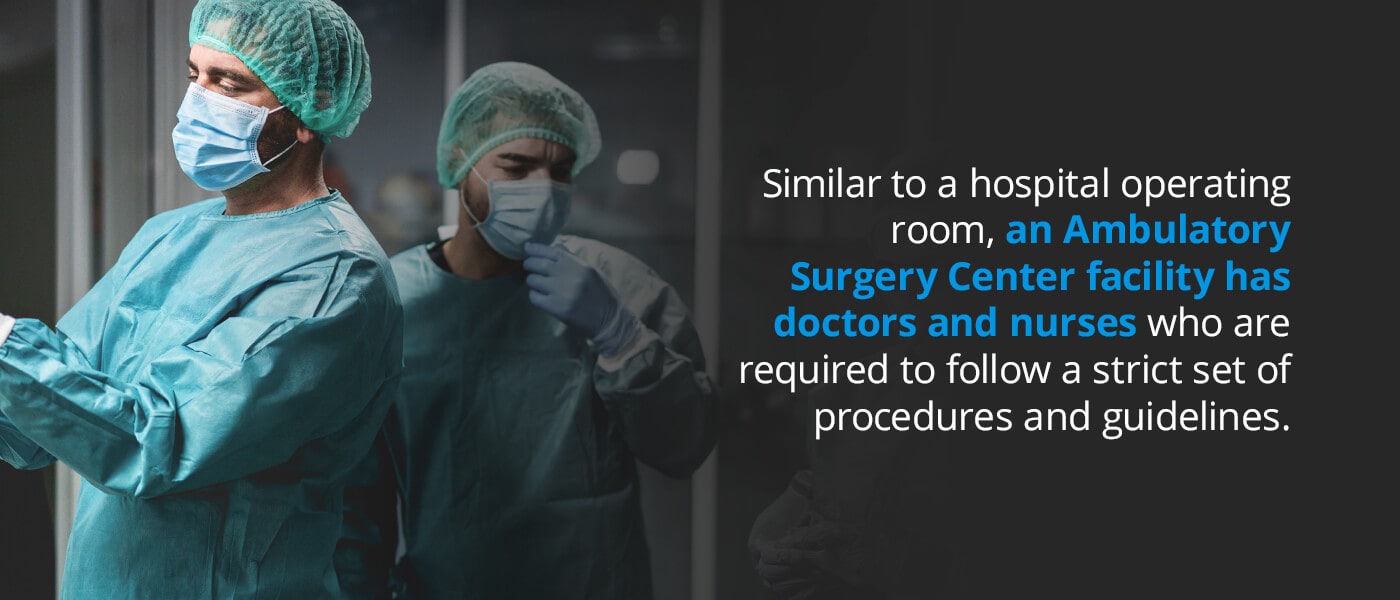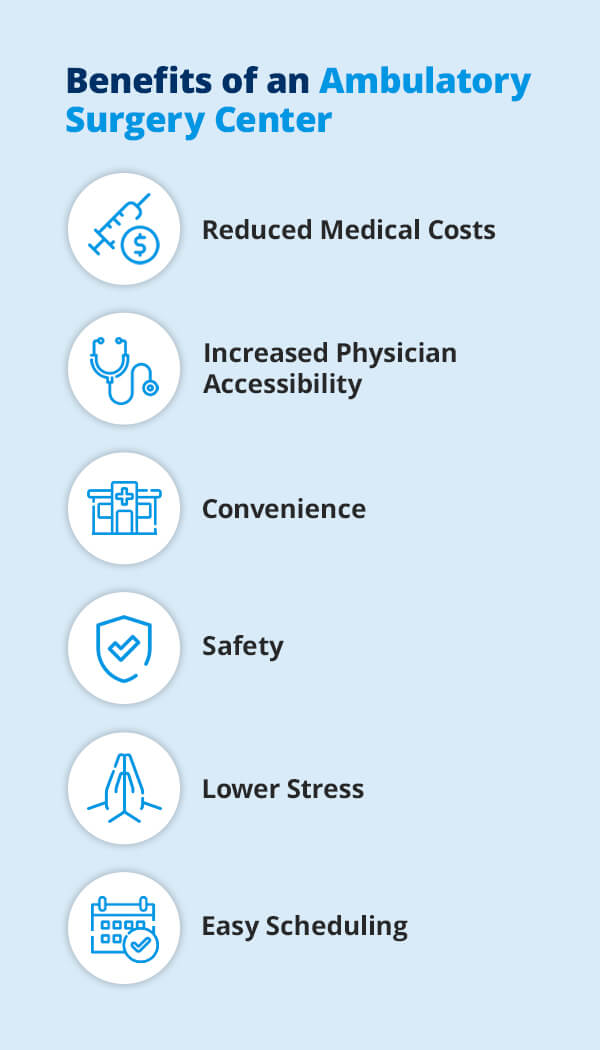
Outpatient procedures are becoming increasingly common in the United States, with doctors performing approximately 129 million outpatient procedures in 2018. That number is expected to grow to 144 million by 2023.
Outpatient operations are typically associated with reduced medication use and other benefits that should reduce the patient’s anxiety. But patients may become anxious about the idea of undergoing surgery outside of the hospital setting.
If your doctor has recommended you undergo an outpatient surgical procedure, you may be feeling some of that worry. But, while some anxiety surrounding surgery is natural, there’s no reason to be worried about having your operation done at an outpatient facility.
Outpatient procedures provide a high level of care and, in some cases, have been found to reduce the chances you’ll need to be admitted to the hospital later on. The best way to ease your anxiety and properly prepare for your operation is to understand more about what outpatient surgery is, where it’s performed and what you can expect.
Outpatient surgeries are typically performed at one of two locations — an outpatient surgery center (OSC) or an ambulatory surgery center (ASC). These two terms are often used interchangeably among patients — and sometimes physicians. But there are important differences between the two to understand before you undergo a procedure.
What Is an Outpatient Procedure?
Outpatient surgery is a surgical procedure completed in just a few hours, and it doesn’t require a patient to stay overnight in a hospital. In some cases, it may be performed in a hospital, but it has become increasingly common for outpatient surgeries to happen in a dedicated outpatient clinic. Some of these clinics are attached to or associated with a local hospital. Others are freestanding and not associated with a local hospital at all.
Some common procedures professionals can offer as outpatient surgeries include:
- Cataract surgery
- Tonsillectomies
- Gallbladder removal
- Hernia repair
- Muscle and tendon repair
- Joint repair and replacement
- Lumpectomy
- Meniscus repair
- Nerve treatment
- Removal of melanoma and other skin cancers
- Laser skin resurfacing and other cosmetic surgeries
Some outpatient centers also perform diagnostic operations, such as biopsies, endoscopies and colonoscopies. Sometimes, outpatient surgical procedures can be performed in a doctor’s office, or a doctor may have a surgical unit attached to their practice.
What Are the Benefits of Outpatient Surgery?
Outpatient surgery is typically performed when there is a low risk of post-operative complications and recovery can easily be managed at home. It has various benefits, including:
1. Reduced Discomfort
Regardless of which surgery you face, there is going to be some pain and discomfort as you recover. But recovering at home rather than in a hospital can reduce the discomfort you experience.
With an outpatient procedure for joint replacement, for instance, the pain medications administered during and immediately after the operation are designed to reduce your pain. Rather than laying in a hospital bed with a pain pump, you’ll be sent home with a long-lasting anesthetic to assist with pain management in the first few days after your surgery.
Let’s be honest — staying in a hospital isn’t relaxing for anyone. Going home means you can recover in bed or on the couch. When you’re more relaxed, you’ll be able to handle pain and discomfort better. You’ll also have more distractions from your pain, like family members, a beloved pet or your favorite television programs.
2. Increased Mobility
Today’s orthopedic surgeries aren’t your grandmother’s hip replacement. If you undergo a joint replacement procedure, you’ll be encouraged to be on your feet and attempt limited physical activity within a few hours after your surgery. This achievement is better accomplished in a home setting because you aren’t restricted to your bed or a hospital room.
Regardless of the type of surgery you experience, a home recovery also gives you assistance from loved ones rather than waiting for a nurse to help. Even the best of nurses have several patients at the same time, which limits how much personal attention you’ll receive. Being around loved ones, visiting the refrigerator for a snack or walking down the hall to the bathroom all increase your opportunities to stay mobile, ultimately reducing your recovery time.
3. Lower Risk of Infection
Hospitals are full of people with a lot of health problems. The less time you need to spend in one, the healthier you can stay. Undergoing an outpatient surgical procedure reduces your risk of contracting an illness or infection.
Even if you aren’t exposed to other patients in a hospital setting, there are constantly people coming and going from your hospital room — nurses, cleaning staff, doctors, food service workers. They can potentially bring germs to you. At home, you aren’t exposed to all these different people, which can protect your immune system when it’s compromised from surgery.
4. Better Recovery
If you’re at home in your own bed, you’ll likely sleep better. The better you sleep, the quicker your body can begin to heal. Recovering at home also typically reduces a patient’s stress levels, which also aids in a faster healing process.
Undergoing outpatient surgery also means that you’ll be available to start rehab or physical therapy quicker after your procedure. In some cases, a joint replacement patient can begin physical therapy the day after surgery. The sooner you begin your treatment, the shorter your recovery will be.
What Is an Outpatient Surgery Center?
As outpatient surgeries become increasingly common, many hospitals have established an outpatient surgery center to handle outpatient procedures. An outpatient surgery center is a surgical unit owned by a hospital. In a lot of cases, it’s actually attached to the hospital itself, but this isn’t always the case. Sometimes, they may be down the street or even a couple of miles from the hospital.
Regardless of its location, an OSC is subject to the governing hospital’s rules and regulations, as well as their price structure. This setup typically means their prices will be higher than other outpatient options because hospital price structures use a different formula than a freestanding surgical center or doctor’s office.
What Are the Benefits of an Outpatient Surgery Center?
Price aside, the benefits to undergoing a procedure at a facility like this include:
1. Simplicity
If you are already enrolled in a local hospital’s health system, your personal information — including insurance — may already be in the system. You’ll have less paperwork to deal with before your procedure. It can also be easier to track your overall health by using that health system’s dedicated online portal. If you’ve used that hospital before or it’s near your other doctors, there’s also something to be said for having an operation done in a familiar setting.
2. Proximity
Although most outpatient procedures go as planned, having surgery near a hospital can be comforting to some patients. If complications do arise, many outpatient surgery centers are in or near a local hospital, which means acute care is nearby.
3. Recovery at Home
Undergoing surgery at an outpatient surgery center means you’ll be done and home by the end of the day. Recovering in your own bed rather than a notoriously uncomfortable hospital bed can be quite the relief. The food is better at home, too!
What Is an Ambulatory Surgery Center?
An ambulatory surgery center is similar to an OSC except for one important detail — an ASC is independently owned and operated. Although some are located close to a hospital, they are not required to be within a certain proximity to one. They are not subject to the rules, regulations or pricing structure of a hospital, either.
Like OSCs, ASCs typically perform outpatient surgeries, as well as diagnostic and preventative procedures, such as colonoscopies and endoscopies. Similar to a hospital operating room, an ASC facility has doctors and nurses who are required to follow a strict set of procedures and guidelines. It’s their job to ensure a safe, sterile environment and a successful operation.
What Are the Benefits of an Ambulatory Surgery Center?
ASCs often specialize in specific procedures, so you can go into the facility knowing the professionals there are familiar with your condition and prepared to provide the highest level of care. Among its various benefits, an ASC surgery can provide:
1. Reduced Medical Costs
The cost of outpatient surgery at a hospital-run facility versus an ASC makes the latter option appealing to many. ASCs typically have a lower cost, depending on your specific procedure and situation.
This cost difference comes from how hospital pricing structures are set up. An ASC is not subject to this same pricing structure, which means they can offer the same procedures at a fraction of the cost. In fact, the Department of Health and Human Services estimates undergoing procedures in an outpatient surgery center instead of in hospitals would save Medicare patients $3 billion. It would also save taxpayers an estimated $15 billion.
But don’t mistake the lower cost with a decrease in quality. An ASC provides the same — if not higher — level of care for your procedure. A lot of patients find they receive better care in an outpatient ASC environment because surgeons and nurses are only dedicated to their care without the restrictions and expectations a hospital imposes.
2. Increased Physician Accessibility
In an outpatient center setting, physicians are still required to adhere to strict rules and regulations. But they have more control over their work and the level of care they provide. Patients may find doctors in an outpatient care facility spend more time with them before and after their procedure and take more interest in their overall wellbeing. Doctors also often feel more relaxed when they aren’t working in a hospital environment. They can spend more time interacting with patients and aiding their post-operative recovery.
Many patients find this increased level of personalized attention comforting before and after a surgical procedure. Having a doctor nearby and invested in your wellbeing goes a long way toward easing anxiety and helping patients feel comfortable with what’s happening to them. After all, it’s easier to trust a doctor you can connect with before your operation or treatment.
3. Convenience
Outpatient care facilities are often easier to access for patients. In some cases, you may even be able to choose a center closer to your home, reducing the amount of time you spend traveling to and from your procedure.
This convenience can be especially helpful because riding in a car for a prolonged time may be difficult or uncomfortable after certain procedures. It’s also beneficial for those who don’t have a car or need to rely on a friend or relative to provide transportation to and from their surgery.
3. Safety
Even in the cleanest hospital setting, you still don’t have a lot of control over who else is there and what you are exposed to. Hospitals are there to provide care in emergencies, which means they can never quite predict who will be there or what germs they will bring in with them.
At an outpatient surgery center, all procedures are scheduled in advance. Patients typically undergo a rigorous medical screening process before arriving for their operation. You won’t be allowed to undergo a procedure if you aren’t healthy, and neither will other people who could share their germs with you. Because you spend less time in an ASC than in the hospital, you can have a lowered risk of encountering germs or developing an infection.
4. Lower Stress
Undergoing surgery can be stressful. Many patients worry about the outcome of the procedure, how they’ll feel after it’s over and how their recovery will impact their daily routine. This stress can be compounded by an impending hospital stay, especially if the hospital has a strict visitation policy that will prevent a loved one from accompanying them. An outpatient procedure can often reduce a patient’s stress because they know they will be able to recover at home with their loved ones nearby.
5. Easy Scheduling
If you schedule a procedure at a hospital, it’s always subject to change if an emergency arises or your doctor is called into another more pressing surgery. Outpatient centers don’t handle emergency surgeries, so once you schedule your operation, there isn’t much of a chance that it’ll be changed or canceled. And, if something does come up, you’ll likely have a lot more notice. Everyone is busy these days, so knowing that you have more control over when and where your procedure takes place can reduce the stress you feel leading up to surgery.
Ambulatory Surgery Center vs. Outpatient Hospital: FAQs
Although the terms “ambulatory surgery center” and “outpatient surgery center” are often used interchangeably, they aren’t exactly the same. It’s important to know and understand the difference between an outpatient hospital and an ambulatory surgical center before undergoing a medical procedure. Some of the most frequently asked questions about ASCs and OSCs include:
1. Is Ambulatory Care the Same as Outpatient Care?
The term “ambulatory” refers to any procedure you can receive without staying in the hospital. “Ambulatory” may describe rehab, tests and treatments, as well as surgery. So what is considered ambulatory surgery? Ambulatory surgery and outpatient surgery may be used interchangeably in some circumstances, but their subtle differences are important when it comes to your doctor and your insurance.
This small difference can mean a big change in cost once the bill comes in the mail or gets sent to your insurance company. Be sure to ask your doctor’s office for more information when they are ready to schedule your outpatient surgical procedure.
2. What’s the Difference Between an Outpatient Hospital and an Ambulatory Surgical Center?
The primary difference between an outpatient surgery center — also referred to as an outpatient hospital — and an ASC surgery center is who runs the facility. A center that’s owned and run by a hospital will be subject to that particular system’s rules and regulations. A center not run by a hospital may have a different structure, including costs. If you have private health insurance, you may not really notice the difference. But if you have Medicare or you’re paying out-of-pocket, the differences in cost could be noticeable.
3. Why Would My Doctor Recommend Outpatient Surgery?
Decades ago, surgery required a hospital stay because it was a serious, invasive undertaking. Even minor operations need time in the hospital to ensure that a patient’s recovery was uneventful. With so many advances in modern medicine, including improved technology, most surgical procedures are less invasive and simply don’t require the level of post-operative care necessary in the past. Improvements in anesthesia and pain medication also make extended hospital stays unnecessary in many cases. Going to an outpatient facility for treatment also keeps hospitals free for emergencies.
4. How Do I Prepare for Outpatient Surgery?
Preparation for an outpatient procedure at an OSC or ASC is similar to preparing for surgery in the hospital. In the days before your surgery, a registration representative will contact you to begin your pre-op check-in and ensure all the necessary paperwork is on file. Your doctor may also require certain tests prior to surgery. While you may want to pack a small bag with a few essentials, you don’t need to bring a suitcase or an overnight bag for outpatient surgery.
On the morning of your outpatient surgery, you’ll be asked to:
- Wear loose clothing and comfortable shoes
- Remove all jewelry, including piercings
- Remove contact lenses and wear glasses
- Refrain from eating or drinking anything listed in your pre-op instruction packet
- Bring your photo ID, insurance card and other relevant paperwork with you
Your doctor will advise you about showering and other hygiene-related matters before the day of your surgery.
5. Is Outpatient Surgery Safe?
One of the most common questions patients ask when considering outpatient surgery is, “Is it safe?” While certain risks are involved in any surgical operation, having an outpatient procedure does not present any additional risks to in-hospital treatments.
While these centers are not attached to a hospital, they are still governed by strict state and federal regulations. ASCs and OSCs are subject to regular oversight to ensure that they adhere to the highest quality of safety and practice. And research has shown that patients who undergo procedures in an ASC are actually less likely than their in-patient counterparts to end up in the hospital with post-surgery complications.
Seek Orthopedic Care With OrthoBethesda
At OrthoBethesda, we’re committed to providing you with the highest level of care every step of the way. We prefer a conservative approach to treatment by offering a variety of therapies and solutions before we turn to surgery. But, in some cases, surgery is the necessary step toward repairing an injury or correcting a chronic condition.
We proudly provide a personal, private setting to diagnose, treat and monitor your progress every step of the way. As industry leaders in outpatient surgery techniques, robotics and outcomes, our experienced orthopedic surgeons offer cutting-edge surgical procedures in an outpatient setting, reducing your costs and improving your recovery.
If you’ve been told you need outpatient surgery or you suspect you need orthopedic care, contact OrthoBethesda or schedule an appointment with one of our providers today.










